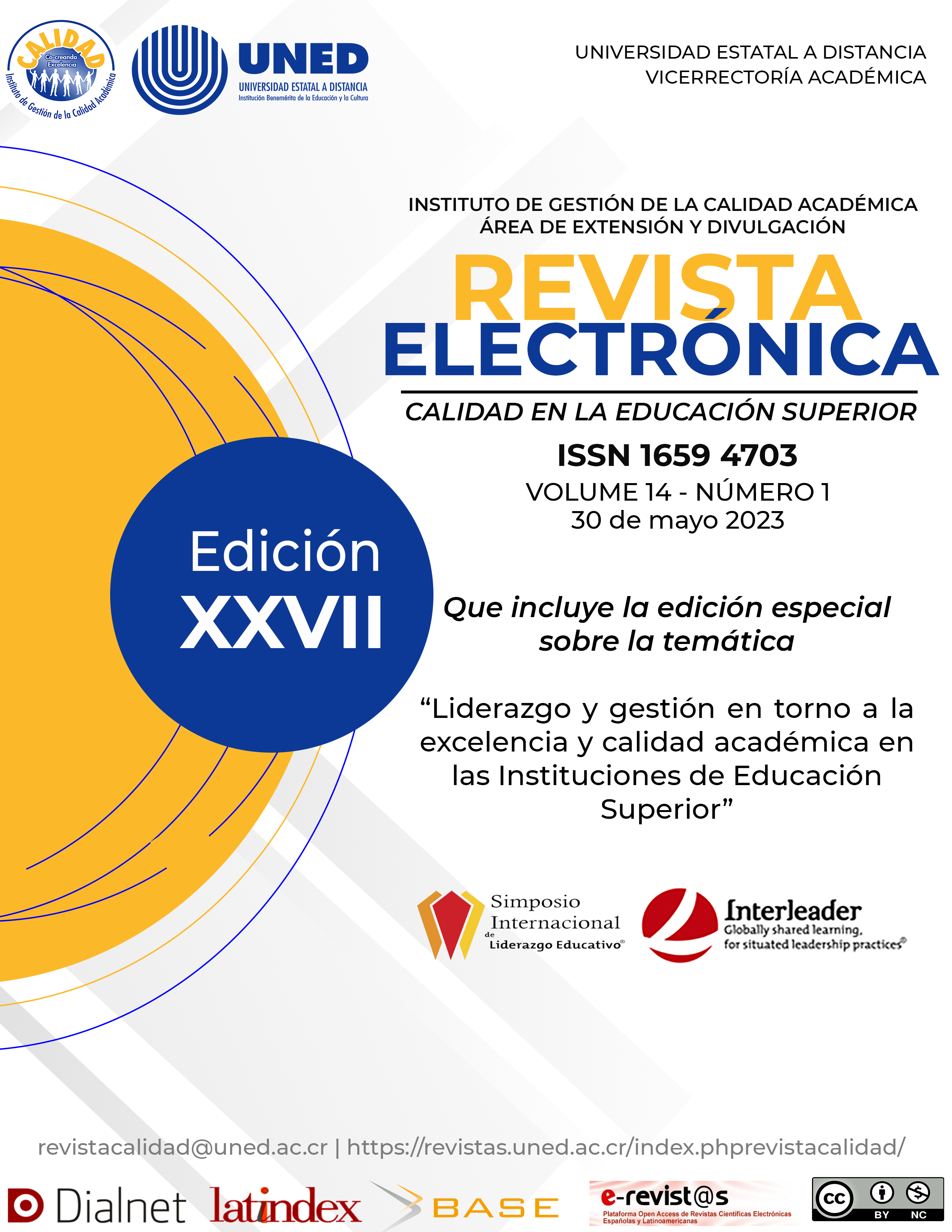Formación de líderes académicos en la educación superior. La importancia del contexto para el desarrollo eficaz del liderazgo
DOI:
https://doi.org/10.22458/caes.v14i1.4697Keywords:
academic leaders, leadership development, higher education, CanadaAbstract
Amidst the changing nature of higher education, one may wonder how leaders of higher education institutions [HEIs] can succeed and thrive in today’s highly uncertain environments. This qualitative case study examined the factors, practices, and competencies that contributed to effective leadership development of academic leaders at one Canadian university. Through the document analysis and qualitative interviews with academic leaders, it explored the organizational context and individual strategies and competencies that supported leaders in their roles in higher education [HE]. The analysis showed the significance of context as a crucial factor in the effectiveness of leadership development. The findings support further work on developing a different approach to leadership development for academia; one that is founded on an understanding of what academic leaders and their institutions require to succeed and flourish during this time of unprecedented change.
References
Amey, M. J. (2010) Leadership in higher education. Change: The Magazine of Higher Learning, 38(6), 55-58. https://doi.org/10.3200/CHNG.38.6.55-58
Anderson, D., & Johnson, R. (2006). Ideas for leadership underpinning proposals to the Carrick Institute: A review of proposals from the ‘leadership for excellence in teaching and learning program. The Carrick Institute for Learning and Teaching in Higher Education.
Anthony, S. G., & Antony, J. (2017). Academic leadership: Special or simple. International
Journal of Productivity and Performance Management, 66(5), 630-637. https://doi.org/10.1108/IJPPM-08-2016-0162
Arsenault, P. M. (2007). A case study of a university leadership seminar. Journal
of Leadership Education, 6, 14-24.
Barling, J. (2014). The science of leadership: Lessons from research for organizational leaders.
Oxford University Press.
Black, S. A. (2015). Qualities of effective leadership in higher education. Open Journal of
Leadership, 4, 54-66.
Bolívar, A., & Ruano, R. (2014). Docencia e investigación en el contexto de la universidad actual. Revista Espaço Pedagógico, 21(2). https://doi.org/10.5335/rep.v21i2.4307
Bolman, L. G. & Gallos, J. V. (2011). Reframing academic leadership. Jossey-Bass.
Bowen, G. A. (2009). Document analysis as a qualitative research method. Qualitative Research Journal, 9(2), 27-40.
Bryman, A. (2007). Effective leadership in higher education: A literature review.
Studies in Higher Education, 32, 693-710.
Buller, J. L. (2013). Positive academic leadership. Jossey-Bass.
Bush, T., & Middlewood. D. (2013). Managing and leading people in education. Sage.
Calareso, J. P. (2013). Succession planning: The key to ensuring leadership. Planning for Higher Education, 41(3), 27-34.
Cameron, K. S. (2013). Practicing positive leadership. Berrett-Koehler.
Cannon, M. E. (2020). Enhancing your higher education presidency: Fifteen lessons on
leadership. Rensar Publishing.
Castle, J. B., & Schutz, A. (2002). Voices at the top: Learning from full professors. Canadian Journal of University Continuing Education, 28(1), 79-101.
Cherkowski, S., Kutsyuruba, B., Walker, K. D., & Crawford, M. (2020). Conceptualising leadership and emotions in higher education: Wellbeing as wholeness. Journal of Educational Administration and History, 53(2), 158-171. https://doi.org/10.1080/00220620.2020.1828315
Collins, J. (2001). Good to great: Why some companies make the leap…and others don’t. Harper Business.
Connell, J., Lynch, C., & Waring, P. (2001). Constraints, compromises and choice: Comparing three qualitative research studies. The Qualitative Report, 6(4), 1-15.
Creswell, J. W., & Poth, C. N. (2018). Qualitative inquiry & research design: Choosing among five approaches (4th ed.). Sage.
Day, D. V. (2000). Leadership development: A review in context. The Leadership Quarterly, 11(4), 581–613.
Dopson, S., Ferlie, E., McGivern, G., Fischer, M. D., Mitra, M., Ledger, J., & Behrens, S.
(2019). Leadership development in Higher Education: A literature review and implications for programme redesign. Higher Education Quarterly, 73(2), 218-234. https://doi.org/10.1111/hequ.12194
Fontana, A., & Frey, J. H. (2000). The interview: From structured questions to negotiated text. In
Denzin, N. K, & Lincoln, Y. S. (Eds.), Handbook of qualitative research (2nd ed). (pp. 645-672). Sage.
Downloads
Published
How to Cite
Issue
Section
License
Copyright (c) 2023 Revista Electrónica Calidad en la Educación Superior

This work is licensed under a Creative Commons Attribution-NonCommercial 4.0 International License.
Esta revista provee acceso libre inmediato a su contenido bajo el principio de que hacer disponible gratuitamente la investigación al publico, lo cual fomenta un mayor intercambio de conocimiento global.
